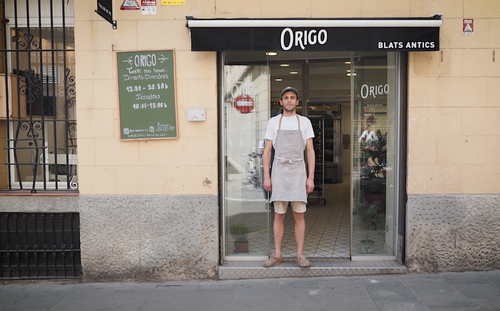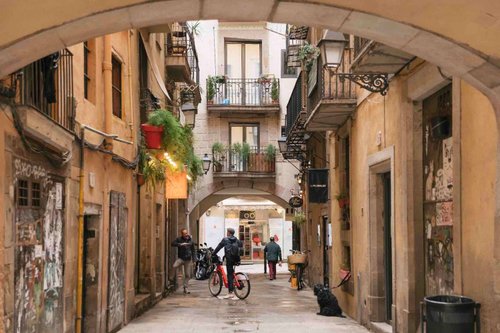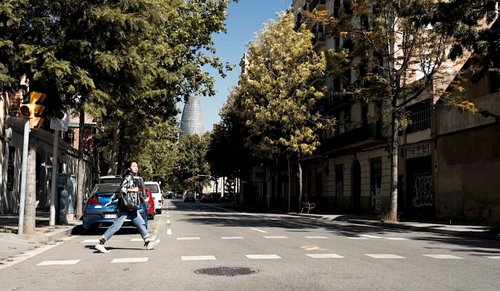How to Land Your Dream Job in Barcelona
Nov 13, 2019
6 mins


Freelance writer, journalist and author
You’re moving to Barcelona, now all you need is a job. We asked HR expert Zara English Janmohamed, partner at executive search firm Loftus Bradford, for the lowdown on where to look for the best role for you. She explains local professional etiquette and provides the key to finding and winning over your potential future employer, so you can get on with knocking their socks off when you get in the door.
Nail that job search
Where to look
LinkedIn is a big one—no surprise there. Other key websites to check out include those for InfoJobs, Welcome to the Jungle and big recruitment firms such as Michael Page and Adecco, as well as 22@, a platform run by Barcelona City Council for entrepreneurs and those looking at the tech sector. “Headhunters and recruiters are also a great way to look for work,” adds English Janmohamed. Don’t forget to Google companies that have their headquarters in Barcelona and check them out.
Maximize your own network: Recommendations through a friend are a great way into a company, especially if your friend introduces you directly. If not, mention the friend’s name in the subject of the email. Facebook expat groups are also an excellent source of information, connection opportunities, and the latest job offers.
How to prepare your CV
You’ve found the job you want to apply for, now it’s time to tailor your résumé toward it and Barcelona-based companies. “It should be a maximum of two pages,” recommends English Janmohamed. “In Spain in general, it should have a photo, address, and personal details at the top, and a short summary about you, your professional experience, and what you’re looking for. Then, work history, education, and any hobbies or extracurricular activities that are relevant to what you’re applying for.”
On the whole, Spanish companies continue to prefer paper résumés, as opposed to, say, video ones, so rein in your creativity, unless you think the company will love it.
When it comes to choosing between the languages of Shakespeare or Cervantes, bear in mind that it should be the language you’re willing to work in—it’s as simple as that! As for Catalan, English Janmohamed recommends not worrying about it: “If it’s an international role, do your résumé in English. If you’re fluent and can work in Spanish, do it in both. For internationals looking in the international arena, we recommend English.”
Is a cover letter a must?
Now your résumé is good to go, you want to stand out from the crowd. But remember your teacher’s favourite proverb: “The best is the enemy of the good.” Don’t overload it with information, or the employer might not read it at all. “Companies get résumés every day, so it’s good to set yourself apart and to give more context, but you should keep it to the point,” says English Janmohamed. “You could write a paragraph introducing yourself, saying, ‘I’m applying for this job because x, y, and z, and think I’m qualified because of x, y, and z.’”
Note that a cover letter is particularly useful if you’re applying from abroad—it gives you the opportunity to explain where you are and why you’re relocating to Barcelona.
Win over your prospective employer
The key to successful preparation
Your interview is scheduled. Now it’s time for that all-important prep. Here are the steps to success:
- Do your research: Your interviewer may well ask questions about them and their company, such as, “What do you like about us?” or “What could we improve?” A little detective work is required, too. Research who you’re meeting, where they come from, how long they’ve been in the company—maybe you have connections? Bear in mind their role in the company—are they your future manager, or the CEO?—and how you plan to address them.
- Prepare examples of your previous achievements so you’re ready to back up your answers. Don’t feel awkward: This isn’t about brazen self-promotion, just tell the story of what you’ve achieved following the CAR model—Context, Action, Result—letting the examples speak for themselves. “‘This is the context, this is the action I took, and this was the result.’ Simple,” says English Janmohamed.
Applying from abroad? Give some thought to explaining your previous roles and the organizations you worked for, because your prospective employer may not be familiar with them and might need to know a bit more. The same goes for your studies, qualifications, and achievements.

The interview
Well done, you’ve made it to the interview stage!
Aim to arrive early, so as to avoid unnecessary running, lateness, or arriving stressed and sweaty (no one wants that!). Be prepared for a traditional interview with one or more people, as well as for a more dynamic debate and lively activity with other candidates—you should be notified of this prior to the event.
Recruitment processes in Barcelona and the rest of Spain have intensified in recent years and you might be expected to argue about anything, from the health benefits of eating McDonald’s daily to why going to the gym can cause weight gain. Or perhaps you’ll be presented with a desert-island scenario, where you have to fight for survival…
Now, the eternal dilemma: What to wear? Shirt or T-shirt? Jeans or trousers? “Do research on the company and the people you’re meeting,” says English Janmohamed, simply. “What are they wearing in their LinkedIn profile? What does the company look like online?”
Bear in mind the industry: The dress code won’t be the same for a bank as for a tech start-up. English Janmohamed’s tip is to get a feel for the company attire upon arrival, and if you see no one is wearing a tie, take yours off, or take your jacket off. She adds, “It can work against you to go too formal, too—it shows a lack of research and a potential mismatch with the values of the company. Dress as you would for a nice dinner.”
- Greetings and body language: To kiss or not to kiss?
When it comes to nonverbal communication upon greeting your interviewer, the key to playing it safe is to mirror their behavior. “Follow their lead and don’t be closed off,” English Janmohamed warns. “Don’t cross your arms or sit to the side—you’ll look nervous. Always be comfortable, be yourself. If they’re sitting facing you, do the same. Sit up straight, have strong eye contact. If you shake hands, make your handshake firm. Show confidence through your body language.” - The lingo—¿Hablas español? ¡Un poquito! Well, don’t panic, because English is widely spoken in Barcelona. English Janmohamed explains the rule of thumb: “If the job is international and the résumé and information are in English, then speak in English.” She adds that it’s OK to confirm whether the interview will be in English, even if your interviewer initially greets you in Spanish. However, if the job is going to be conducted in Spanish, you need to speak in Spanish. ¡Ánimo, que tú puedes!
Don’t worry about Catalan, unless the job is in the public sector and required, although you may want to reel off a couple of key phrases to make a good impression with a local, even if it’s just ‘Adeu!’ as you head out the door.
- Money, money, money. Of course, the salary. We need money to live on in Barcelona, too, but… “Don’t mention salary unless they do,” says English Janmohamed. “No matter how important it is to you, the first stages of the recruitment process should be about the job, the role, the company.”
English Janmohamed, who also set up the Barcelona International LeanIn network, which focuses on helping members to develop and grow in their professional lives in Barcelona, reveals that when it comes to negotiations, “People in general, and especially women, negotiate less than they should. It’s better to go high, then you can always come down. People still think about the financial crisis and don’t negotiate enough. But be clear on what you’re earning now and what your expectation is.”
Post-interview protocol
This is where candidates fall down, according to English Janmohamed, who admits that there is a fine line between coming across as desperate and showing enthusiasm and interest in the role. “It’s key—and professional—to follow up after an interview. You should do it the very day of your meeting, or the next day.”
A simple message will suffice: “‘Thanks a lot, it was great meeting you. I enjoyed our discussion and look forward to hearing from you.’ Do that within the same week, and if you don’t hear anything, follow up after a few days.” Easy!
What not to do: 4 things to avoid
Whatever you do during your interview, don’t put your foot in it. Here’s how to steer clear of sticky moments:
- Avoid religion, politics, and sex. This is good advice for the dinner table, too!
- Don’t apologise for nerves, it’s OK for there to be a silence, to ask to take a moment. Be authentic—it’s better to be yourself and be confident, rather than apologise for your behavior.
- Don’t talk negatively about past employers, even if they deserve it—it will make you look unprofessional.
- Don’t be late! This will be the first impression you make and hard to come back from.
Good luck! ¡Mucha suerte!

More inspiration: Work in Barcelona
Moving to Barcelona for work? Navigate the job jungle in this international hub with our insider tips, advice from locals and insights from industry experts.

Work in Barcelona: François
Originally from Belgium, he left his job at Google in San Francisco to move to Barcelona with his wife, where he decided to open his own bakery.
Dec 11, 2019

Work in Barcelona
Considering relocating to Barcelona? Let’s have a look behind the scenes to understand what it takes to be a happy expat in Barcelona.
Dec 11, 2019

Work in Barcelona: Amy
Born and raised in Canada, Amy moved to Barcelona to change career by retraining as a software developer. Here's her expat experience of the city.
Dec 11, 2019

My Barcelona: ‘The city is so much richer than it seems’
For Anaïs, Barcelona is such an enticing city that she has made it her home not once, but twice.
Nov 13, 2019

My Barcelona: ‘It’s the Silicon Valley of Europe’
Frenchman Erwan Riou originally qualified as an architect, but after a stint in Brazil, the 33-year-old started retraining as a programmer...
Nov 13, 2019
The newsletter that does the job
Want to keep up with the latest articles? Twice a week you can receive stories, jobs, and tips in your inbox.

Looking for your next job?
Over 200,000 people have found a job with Welcome to the Jungle.
Explore jobs